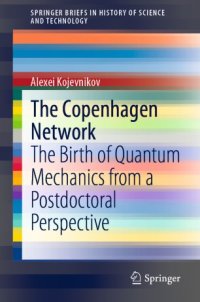
Ebook: The Copenhagen Network: The Birth of Quantum Mechanics from a Postdoctoral Perspective
Author: Alexei Kojevnikov
- Tags: Physics, History and Philosophical Foundations of Physics, Quantum Physics, History of Science
- Series: SpringerBriefs in History of Science and Technology
- Year: 2020
- Publisher: Springer International Publishing
- Edition: 1st ed.
- Language: English
- pdf
This book is a historical analysis of the quantum mechanical revolution and the emergence of a new discipline from the perspective, not of a professor, but of a recent or actual Ph.D. student just embarking on an uncertain academic career in economically hard times. Quantum mechanics exploded on to the intellectual scene between 1925 and 1927, with more than 200 publications across the world, the majority of them authored by young scientists under the age of 30, graduate students or postdoctoral fellows. The resulting theory was a collective product that no single authority could claim, but it had a major geographical nod – the Copenhagen Institute of Theoretical Physics – where most of the informal, pre-published exchange of ideas occurred and where every participant of the new community aspired to visit. A rare combination of circumstances and resources – political, diplomatic, financial, and intellectual – allowed Niels Bohr to establish this “Mecca” of quantum theory outside of traditional and more powerful centres of science. Transitory international postdoctoral fellows, rather than established professors, developed a culture of research that became the source of major innovations in the field. Temporary assistantships, postdoctoral positions, and their equivalents were the chief mode of existence for young academics during the period of economic crisis and post-WWI international tensions. Insecure career trajectories and unpredictable moves through non-stable temporary positions contributed to their general outlook and interpretations of the emerging theory of quantum mechanics.
This book is part of a four-volume collection addressing the beginnings of quantum physics research at the major European centres of Göttingen, Copenhagen, Berlin, and Munich; these works emerged from an expansive study on the quantum revolution as a major transformation of physical knowledge undertaken by the Max Planck Institute for the History of Science and the Fritz Haber Institute (2006–2012).